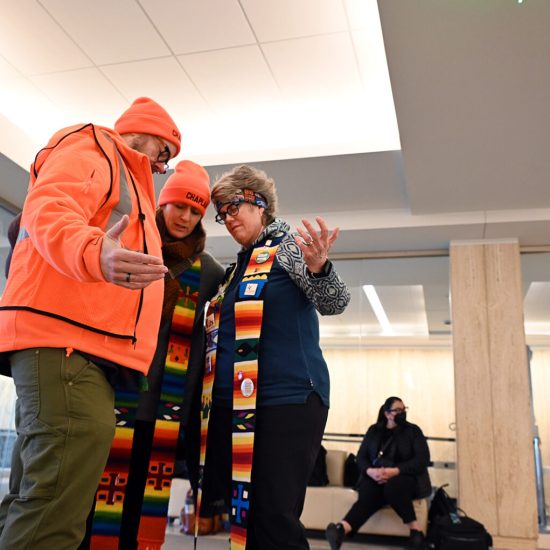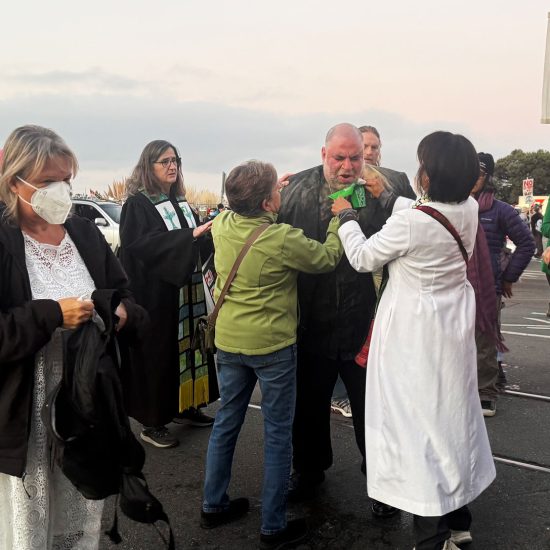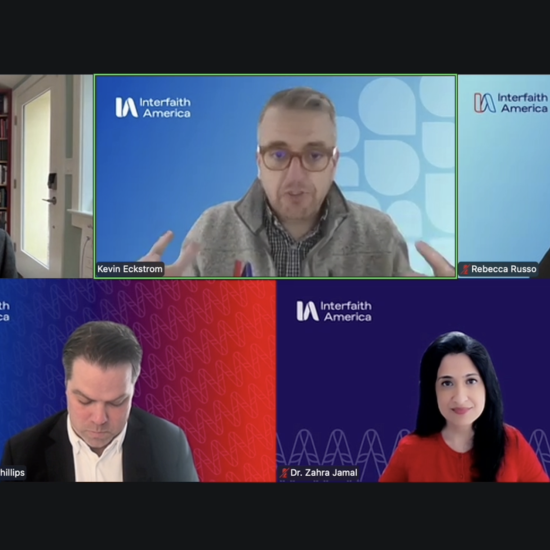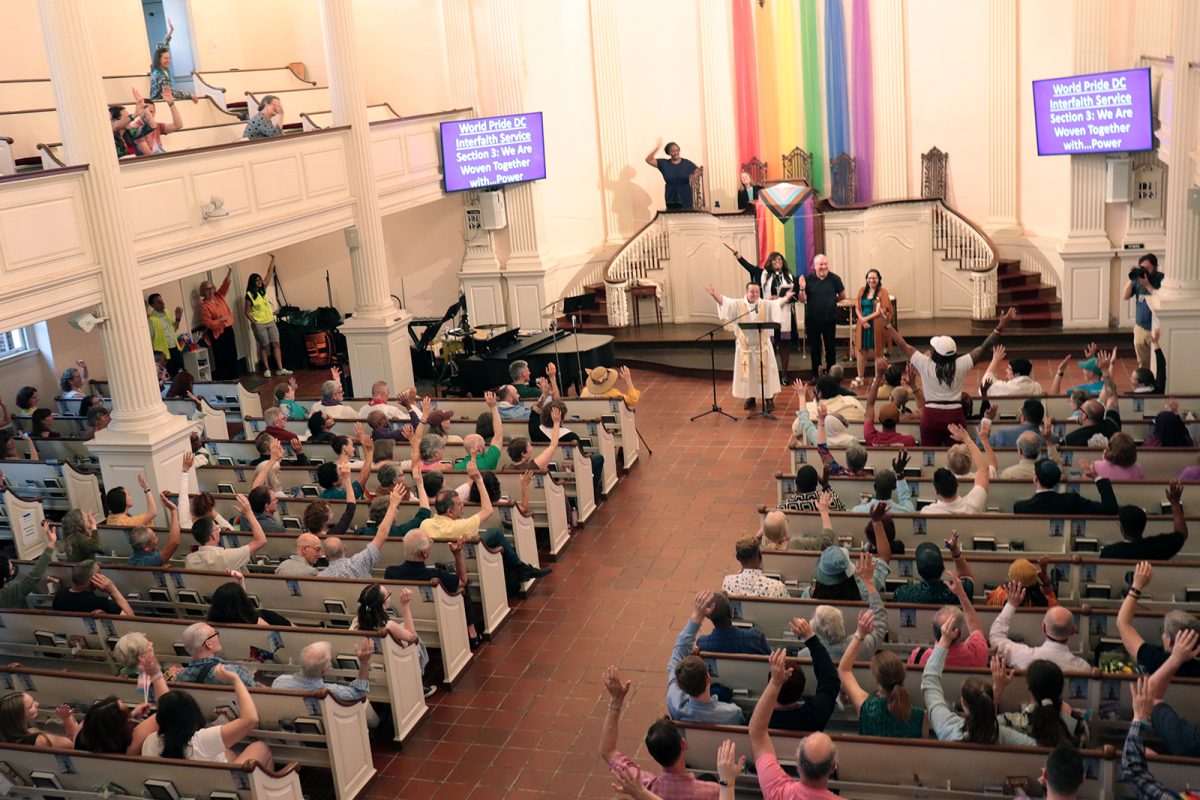
WASHINGTON (RNS) — At a worship service filled with drumming, praying, and clapping, people representing a wide diversity of faiths gathered at a religious event of WorldPride, a 50-year-old, global LGBTQ+ festival that is being hosted by the District of Columbia this year.
“This service is a revolutionary act that continues to say to all we are united,” said the Rev. Darryl! Moch, pastor of a United Church of Christ congregation in Fredericksburg, Virginia, at the beginning of the service at All Souls Church, Unitarian, in the northwest quadrant of the nation’s capital, on Tuesday (June 3).
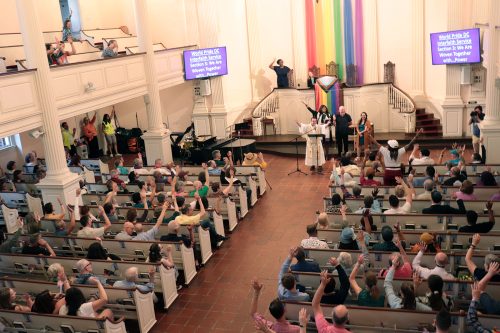
Panelists, center, lead a discussion during a WorldPride interfaith event at All Souls Church, Unitarian, June 3, 2025, in Washington. (RNS photo/Adelle M. Banks)
“We cannot be divided by race, class, national identity, orientation, gender identity, or faith. We are woven together with one spirit, lifting us to be our greater selves,” said Moch.
The worship service has been part of D.C.’s Pride events since early in the AIDS crisis in the 1980s, but this year it became one of hundreds of events of WorldPride, which is held in a different city around the globe each time.
“Being a part of WorldPride expanded our audience on-site and online to attendees and faith leaders around the nation and from other countries,” the Rev. Eric Eldritch, one of the organizers of the worship service, told Religion News Service. “I am totally amazed at the energy above and beyond our 42 years.” The service was coordinated by Center Faith, a program of the DC LGBTQ+ Community Center, and put together by Moch, Eldritch, a pagan clergyperson with Circle Sanctuary in Madison, Wisconsin, and others.
Rainbows adorned the columns outside the church as well as the stoles of the clergy and the hands of the laypeople in the pews as they heard a shofar blown by a rabbi, a Muslim call to prayer, and texts recited by representatives of Muslims, Sikhs, Druids, and Hindus.
Though much of the discussion and Scripture readings focused on love and peace, the current state of politics was also on the minds of speakers.
“Love is still the greatest gift, the thing that can get us through the hardest of times when we’re sick, lonely, we’ve been ignored,” said Bishop Thomas Wieczorek, a leader of the independent, LGBTQ-affirming St. Mary’s National Catholic Church of America in D.C., drawing applause as he described the Pentecost, an event described in the New Testament’s Book of Acts, when people of all races and nations received gifts of the Holy Spirit: “It was probably the first time that we heard a message of diversity, equity, and inclusion.”
Wieczorek pointed to the Pentagon’s rumored plans, reported earlier in the day, to remove the name of gay activist Harvey Milk from a Navy vessel.
“We can’t let that get to us,” said Wieczorek. “We have to look at love and to do that, we have to look at each other and embrace each other.”

Participants perform during a WorldPride interfaith service at All Souls Church, Unitarian, June 3, 2025, in Washington. (RNS photo/Adelle M. Banks)
George Kerr III, a local Presbyterian Church (USA) elder, urged continuing work to prevent and educate about HIV, saying: “HIV is not over. Let me repeat: HIV is not over.”
LGBTQ issues were not the only topic at the service. During a panel discussion, speakers addressed reproductive and immigrant rights.
“As a fundamental human right, we must have the autonomy to make decisions about our bodies and reproductive health,” said Ebony C. Peace, a Unitarian Universalist lay community minister. “It is not only a women’s issue. It’s also a trans issue. It is a nonbinary issue. It is a men’s issue. It is an issue that transcends gender because it impacts all of us and those we care about.”
The Rev. Yoimel González Hernández, a Cuban native and rector of St. Stephen and the Incarnation Church, a local Episcopal congregation, asked people to raise their hands if they or their forebears were born in another country.

All Souls Church, Unitarian, hosted a WorldPride interfaith service June 3, 2025, in Washington. (RNS photo/Adelle M. Banks)
“We are all immigrants in this world,” he said. “Politicians want to divide us into the illegals and legal ones, criminals and citizens, cursed and blessed ones, but there is no illegally in humanity.”
A representative of the trans community spoke of the spiritual power of resistance.
“In a time when political attacks and social rejection attempt to unravel our dignity, we as the trans community continue to rise,” said the Rev. Carmarion D. Anderson-Harvey, affiliated with the Southeast Conference of the United Church of Christ. “We’re anchored by our faith, we’re fueled by our divine purpose and we’re wrapped in the power of our authentic selves. … Our resilience is not just resistance. It is holy. We are holy.”
Some leaders acknowledged that the service did not include speakers who might be considered spiritual but not religious or who might have felt they had been harmed by religion or were not interested in it.
“All traditions, backgrounds and worldviews have not been represented today at this dais, not our Indigenous stewards of some tribes, not atheists, agnostics, secular humanists and many others, but we know that we share the common pursuit for peace,” said Tahil Sharma, faith work director for the National LGBTQ Task Force, before he read a Hindu prayer for peace.
“We are not here to maintain the status quo of injustice by being peacekeepers. We are here to be the peacemakers that can and will call us to the public square when we are tasked to repair the world and make it anew.”
In addition to the service, faith leaders across the country signed a May 28 interfaith call to action issued by a new Lavender Interfaith Network. It urged LGBTQ people to embrace their commonalities and not be divided by their differences, asked religious officials to affirm trans theologians, and encouraged political leaders to defend the Constitution.
“We call upon Faith Leaders to unite in advocacy and pastoral care, challenging their communities to make visible the lives of those under attack, and providing education on trans and nonbinary realities, human sexuality, nonviolent social change, and the systems that increase vulnerabilities to harm and violence,” the statement reads. “Knowledge is power, understanding is liberation, and faith must never be a tool for harm — it must be a beacon of transformation.”

A choir performs during a WorldPride interfaith service at All Souls Church, Unitarian, June 3, 2025, in Washington. (RNS photo/Adelle M. Banks)
Other events across the three-week WorldPride celebration, which ends Sunday, had religious dimensions.
The Capital Jewish Museum, the scene of the recent killings of two Israeli Embassy staffers, has an exhibit titled “LGBT Jews in the Federal City,” open through Jan. 4, 2026, that features such items as a dress worn by Ester Goldberg, a Jewish drag queen in D.C. at the turn of the 21st century, and information about how prayer language has changed to include nonbinary worshippers.
“This landmark exhibition is the first of its kind to explore DC history, Jewish history, and LGBTQ+ history together, drawing from the Museum’s robust LGBTQ+ archive,” the museum’s website says.
Union Temple Baptist Church, a historically Black, LGBTQ-affirming congregation, unveiled a portrait of civil rights activist Bayard Rustin, a Black gay man who was a key organizer of the March on Washington, on June 1.
“Bayard Rustin was not just a civil rights strategist — he was a sacred disruptor and champion for liberation,” said the Rev. Anika Wilson-Brown, the church’s lead pastor, in a statement. “By honoring him, we are reclaiming the fullness of our liberation story. At Union Temple, we believe Blackness and queerness are not contradictions — they are sacred identities worthy of celebration and remembrance.”

